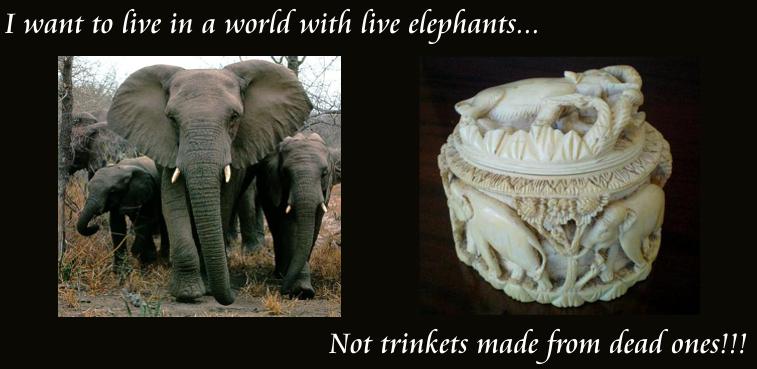



They say that elephants never forget, sometimes I think it would be better if they could given the horrors they have seen during some shocking encounters with humans. Having to see members of their close family groups killed, their tusks hacked off for no other reason than to make trinkets to sell to tourists. We have all heard stories of elephants staying close to the body of a dead group member before reluctantly moving away or of females who will carry the body of a dead calf around with them for days before finally letting go. So for people to say that these amazing animals have no feelings is so very wrong
We have also heard about proud majestic elephants being beaten to make them perform "tricks" for an unsuspecting public. I hope that one day with increased public awareness this will become a thing of the past

The trade in ivory was banned in 1989 which was seen by many myself included as a reason to celebrate. Unfortunately it is still popular in Asia, where it continues to be made into jewellery and trinkets. According to TRAFFIC who monitor wildlife the escalation in ivory trade and rhino killing is being driven by Asian syndicates that are now firmly enmeshed in African societies. 2011 was the worst year for elephants for decades. An estimated 38,000 were butchered for their tusks - eight per cent of the total in Africa. If the killing continues at this rate all the elephants could be wiped out by 2020. In 23 years of collecting ivory seizure data 2011 has been the worst year ever for large ivory seizures. 2011 was a horrible year for elephants. Things can only get better and I really hope they do BEFORE it is too late!
UPDATE: 13th November 2012

INDONESIA: Three endangered Sumatran elephants have been found dead, apparently the latest in a string to be poisoned.
The bodies found in Riau province, takes the total killed since March to 16
The poisonings could be accidental as farmers use pesticides to protect their crops. You cannot help but wonder if these chemicals are strong enough to kill elephants will the crops they are used to protect be safe for humans to eat?
Fewer than 3000 Sumatran elephants are left in the wild